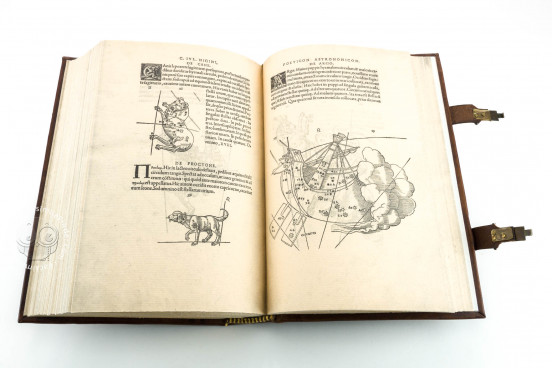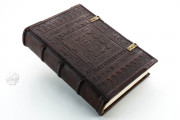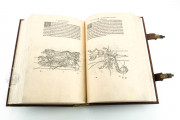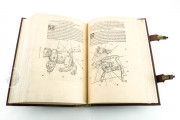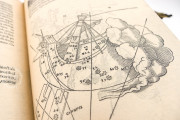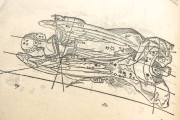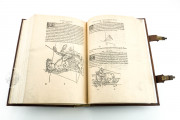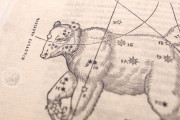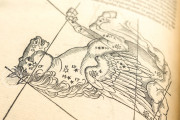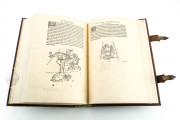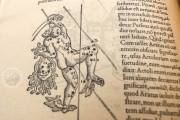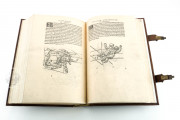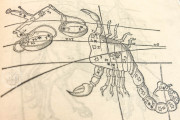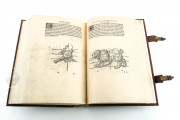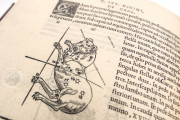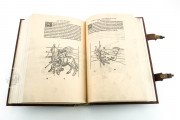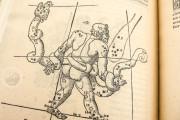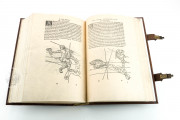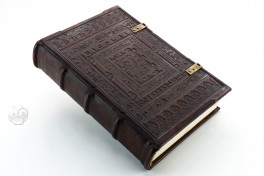On the Revolutions of the Celestial Spheres is a composite volume containing the first edition (Nuremberg, 1543) of Nicolaus Copernicus's explanation of the heliocentric universe; a collection of constellation myths attributed to C. Julius Hyginus and published in Cologne in 1534, and George of Trebizond's Latin translation–published in Cologne in 1537–of a portion of the Almagest by the ancient Greek astronomer Ptolemy dealing with the constellations. Copernicus's text is illustrated with more than 100 woodcut diagrams, and Hyginus's with 47 charming woodcut illustrations of constellations.
The First Edition of De revolutionibus
The first edition of On the Revolutions of the Celestial Spheres (De revolutionibus orbium coelestium) remains one of the rarest treasures of Renaissance science. Among the eleven original copies discovered in Poland, one stands out: a volume preserved from the Königsberg collection of Duke Albert of Prussia. This artifact represents not only a milestone in the history of astronomy but also a symbol of the shifting intellectual horizons of the 16th century.
The Greatest Work of Nicolaus Copernicus
Nicolaus Copernicus’ legacy has inspired an immense body of scholarship. At the center of this vast bibliography lies his magnum opus, De revolutionibus orbium coelestium libri VI. While its scientific impact is universally recognized, far fewer studies focus on the bibliographic and material aspects of the surviving 16th-century editions. These details—bookplates, bindings, and provenance—offer unique insights into how the heliocentric theory was circulated, studied, and preserved.
In 1970, historian Owen Gingerich undertook a groundbreaking project to bridge this gap. His exhaustive research traced the surviving first and second editions of De revolutionibus—the 1543 Nürnberg edition published by Johannes Petreius, and the 1566 Basel edition printed by Henricpetri. Gingerich’s quest, carried out across renowned and lesser-known libraries worldwide, revealed more than 250 copies of the first edition alone—about half of the estimated 400–500 originally printed.
The Polish Copies and the Toruń Treasure
Among the many surviving volumes, twelve copies were located in Poland (eleven after the theft of one in 1998). The most remarkable of these, both for its provenance and its artistic features, belongs to the Library of the University of Toruń (reference Pol.6 III.142). This copy, today regarded as one of the crown jewels of Polish heritage, traces its history back to the celebrated Königsberg Castle Library.
The Nova Library and Its Origins
The Toruń copy reached Poland in the late 1940s as part of the so-called Nova Library, also known as the Castle Library, the oldest foundation of the State and University Library in Königsberg. This institution originated in 1529 when Crotus Rubeanus, secretary to Duke Albert of Prussia and co-author of the satirical Epistolae obscurorum virorum, acquired 68 books for the ducal court.
By 1540, the collection had grown to around one thousand volumes, and in 1544 it became the official academic library of the newly founded University of Königsberg. At its inauguration, the poet Wilhelm Gnapheus delivered a reading—ironically, the same author who would later mock Copernican theory in his play Morosophus.
The Journey of a Masterpiece
Like many rare books, De revolutionibus traveled through turbulent times. Following World War II, the manuscript—once part of the Silesian Count Otto von Nostitz’s library—was nationalized in Prague in 1945. By 1956, it had been formally transferred to Poland by the Czechoslovak government, joining the holdings of the Jagiellonian Library.
The Königsberg Castle Library itself was a hub for European works, importing volumes from Basel, Strasbourg, Wittenberg, Cologne, and Nürnberg—the city where Copernicus’ work was first published. Professional book dealers likely facilitated the delivery of these scientific masterpieces, ensuring that De revolutionibus would be read alongside the writings of Ptolemy and Hyginus.
The Prussian Duke and Copernican Legacy
Historical evidence suggests that the Toruń copy may well be the very book gifted in 1543 to Duke Albert of Prussia by Georg Donner, a canon from Warmia and close confidant of Copernicus. Duke Albert, known for his extensive scholarly networks, did not keep all gifts for his personal use. Instead, he deposited many in the Castle Library, particularly duplicates or works that did not capture his direct interest.
Thus, it is plausible that the Duke’s copy of De revolutionibus, originally presented by Donner, was quickly absorbed into the public collection. There it joined other treasures, including Georg Joachim Rheticus’ Narratio Prima (Gdańsk, 1540), a preliminary account of Copernican theory.
The End of the Journey
Bound together with works by Ptolemy and Hyginus by the Königsberg binder Caspar Angler, the volume was catalogued in the Castle Library in 1543, where it remained until the chaos of World War II. In 1944, retreating German forces evacuated the library westward, only to abandon the transport in Karwiny Manor near Pasłęk—territory that would soon fall within Poland’s new borders.
Rediscovered in the aftermath of war, the book entered the collections of the newly established University Library in Toruń. Today, the Königsberg copy of De revolutionibus orbium coelestium is considered one of the most valuable volumes in Poland, a direct witness to the scientific revolution that reshaped humanity’s understanding of the cosmos.
The Physical Characteristics of the Toruń Copy
The Toruń copy of De revolutionibus is remarkable not only for its intellectual significance but also for its material craftsmanship. The volume features boards measuring 29 × 16 cm, originally covered in brown calfskin—the same binding material used for books in the Castle Library during the tenure of librarian Polyphemus. In later years, this brown calfskin was replaced with white pigskin, a material that gained popularity in Germany at the time.
The book block is secured to the covers with three sturdy bindings, ensuring its structural integrity over centuries of use. The spine, now covered in dark brown leather—likely applied in the 19th century to replace the original—shows visible wear, a testament to the volume’s extensive handling and historical journey. This combination of durability and historical craftsmanship adds to the volume’s significance as a rare surviving artifact of Renaissance scientific literature.
The volume was equipped with 29 x 16 cm boards, covered with brown calfskin, the same one used to bind books from the Castle Library during Polyphemus’ tenure as librarian. Later it was replaced by white pigskin popular in Germany at the time. The covers are connected with the book block using 3 bounds. The spine is covered with dark brown leather, applied probably in the 19th century in place of the original leather, now visibly worn due to frequent use.
We have 2 facsimiles of the manuscript "On the Revolution of the Celestial Spheres":
- Mikołaj Kopernik - De revolutionibus orbium coelestium libri VI facsimile edition published by Bernardinum Wydawnictwo, 2006
- Mikołaj Kopernik - De revolutionibus orbium coelestium libri VI facsimile edition published by Orbis Pictus, 2006

